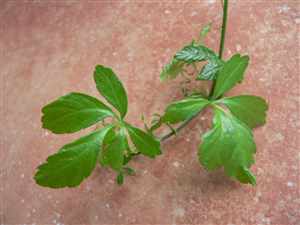Jiaogulan (Gynostemma pentaphyllum)
Main Facts about Jiaogulan

Using Jiaogulan
Jiaogulan is known as an adaptogenic herb, meaning that it increases the body's overall resistance and helps to normalise bodily functions. Full of antioxidant, it gives a boost to immune system, increases body's energy and endurance level, and is the perfect herb for anyone who wants to improve his/her athletic performance. Jiaogulan is great in regulating cholesterol (it is recommended to take 10 mg of Jiaogulan extract three times daily to lower cholesterol level) and effective in reducing blood pressure. Jiaogulan, when combined with other herbs, has beneficial effects on cardiovascular system, increasing heart stroke volume, coronary flow, and cardiac output while reducing the heart rate, without affecting arterial pressure. Jiaogulan tea has been studied in a randomized controlled trial in type 2 diabetic patients. It may have potential as a hypoglycemic treatment to reduce blood glucose. It also assists a good weight loss program, by improving and strengthening digestion. At the same time, it helps an underweight person by assisting the absorption of nutrients. Jiaogulan tea is also thought to help relieve coughing, colds, and other respiratory issues like chronic bronchitis.Jiaogulan is a remedy for: Cold and flu
Caution!
Other than causing nausea and increased bowel movements in some people, it's not known to have many negative side effects. Do not take Jiaogulan if pregnant or breastfeeding. Do not take it if you have a bleeding disorder. Do not take it if you are scheduled for surgery in the next two weeks. Jiaogulan might increase the risk of bleeding.Cooking with Jiaogulan
Jiaogulan is most often consumed as a tea, but you can also get it in extract, pill, and capsule form. The vine’s leaves were first used as a food, and could be eaten by themselves or used in a salad. They're also used as a sweetener. Tea made from the leaves is caffeine-free and has a slightly bittersweet taste.How to grow Jiaogulan
Jiaogulan can be grown as an annual in most temperate climates, in well-drained soil with full sun. It does not grow well in cold climates with temperatures below freezing.| Jackfruit |
Jujube
|